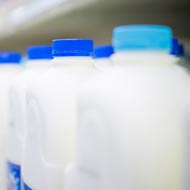
Suppliers not tackling the disease may be delisted
Farmers who refuse to commit to a Johne’s control strategy may lose their contracts with milk buyers.
According to Farmers Weekly, the Tesco Sustainable Dairy Group (TSDG) and Barber’s Farmhouse Cheesemakers have terminated agreements with some their suppliers.
Speaking at the Action Johne’s Conference in Worcester (7 February), Anthony Barber told delegates that suppliers who do not engage with Johne’s control will be delisted.
“It devalues the whole process of having a plan if we don’t,” he said. “It only works if it is done collectively, there is no point doing it if we are going to tolerate sub-standard. If you are not in you are out.”
Robert Smith, of the TSDG, added that all milk suppliers should have a control programme.
“We have removed farmers who didn’t want to test from the pool,” he said. Compliance is expected. We have now reached the point where all milk sold by Tesco is Johne’s tested. We want to get to a situation where all herds are safe to buy from.”
Launched in 2015, the Action Johne’s Management plan was developed to assist with the management and reduce the incidence of Johne’s disease in dairy cattle.
In phase one of the plan, farmers were asked to assess the risks of entry, presence and spread of MAP infection in their herd. Phase two, launched at the Action Johne’s Conference, is set to focus on the close relationship between dairy farmers and vets.
Lyndon Edwards, chair of the Action Group commented: “Phase I of the Action Johne’s Initiative has been a true success and an excellent example of collaborative work throughout the industry. We believe close to 50 per cent of dairy farmers are involved in surveillance and milk buyers accounting for just over 80 per cent of milk supply in Great Britain have signed up to the Initiative.”
He continued: “We are keen to go even further and we have an ambitious plan of action for Phase II, focusing on close relationships between dairy farmers and vets for optimal results.
“We strongly believe that all of us in the dairy industry, farmers and purchasers alike, can benefit from an effective management and reduction of the incidence of Johne’s in the national dairy herd.”



 The Animal and Plant Health Agency (APHA) has updated its online reporting service for dead wild birds.
The Animal and Plant Health Agency (APHA) has updated its online reporting service for dead wild birds.